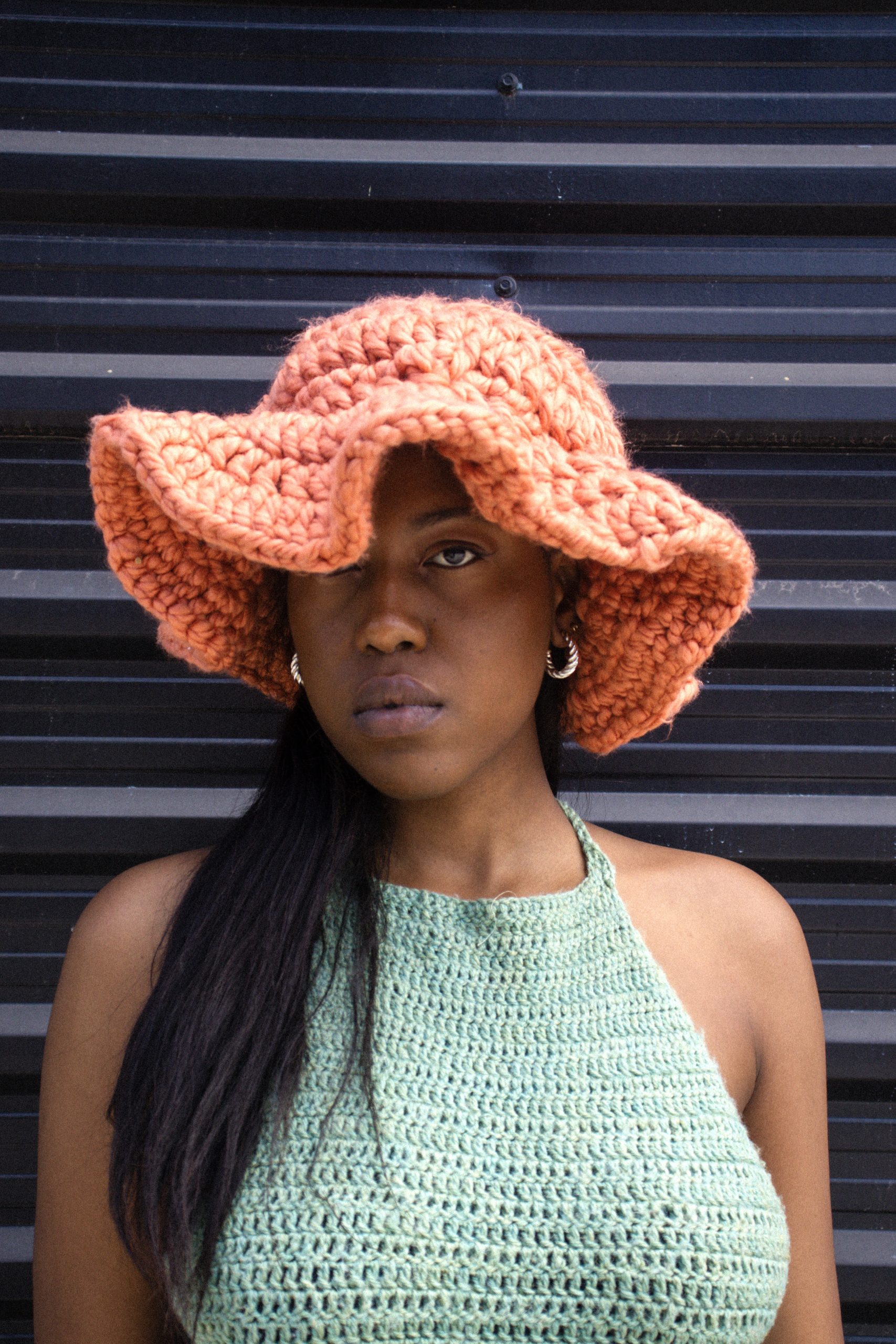Kuchubé is a sustainable fashion brand in Zambia, founded in 2023 by Lubona Abigail Chibwa. The emerging brand, heavily inspired by upcycling, uses different textiles from acrylic to wool yarn, denim, t-shirts, and various other materials, transforming them into ready-to-wear pieces like swimwear, dresses, bags, and hats.
In April, Kuchubé became the recipient of the African Fashion Development Initiative (AFDI) grant. The micro-grant is given quarterly to budding fashion entrepreneurs in Africa who are looking to scale up their businesses. The AFDI is catering to the continent’s lack of investment opportunities with its quarterly micro-grants. And for a small emerging brand like Kuchubé, it can expand its reach and growth.
In Zambia, the fashion ecosystem is relatively small compared to countries like South Africa and Nigeria. And over time, fashion businesses have cited a lack of support and financial constraints as one of the setbacks that have negatively impacted the scene. According to Statista, the market is presently valued at US$173.91m in 2025 and is projected to grow annually by 3.59 per cent (CAGR 2025-2029). However, names like Mangishi Doll, Lace Designs, House of PML, and Nkanda Yatu are some of the country’s brands that continue to sustain themselves despite the industry’s low value.
Now with a micro-grant, Kuchubé is gearing up to expand its reach and growth. iMullar speaks to the founder of the brand, Lubona Abigail Chibwa, about Kuchubé’s beginning, navigating Zambia’s conservative fashion market, and how the conversation around sustainability in Africa can become inclusive and better.
What does Kuchubé stand for? Can you share the story behind the brand and when it was founded?
Kuchubé stands for women’s empowerment, sustainability, and ethics in fashion and overall – community. I am inspired by the African proverb of Ubuntu, which translates to “I am what I am because of who we all are.” My huge inspiration for Kuchube was textiles and upcycling. I wanted to bring enough visibility on the impact of fast fashion, and also bring more solutions. Instead of diverting clothes into the landfills, I wanted to see how clothes can be recycled and how it can empower local designers and our textile industry.
The brand began in 2023, but I have had the idea for the brand since 2021, during my years at the university. I had the vision, but I didn’t know how to go about it. I didn’t know how to crochet or sew; despite coming from a family of women who were dressmakers, all I knew how to do was doodling. At that time, I had a friend who was into crochet, and I would always support her by going to the yarn shop with her. Later, I picked up crochet as a hobby after realising I was more of a visual learner. With crochet, I learnt you could improvise and also guesstimate, unlike sewing, where measurement is very crucial. In addition, the art of crocheting was an intuitive gift given to me because it was very easy for me.
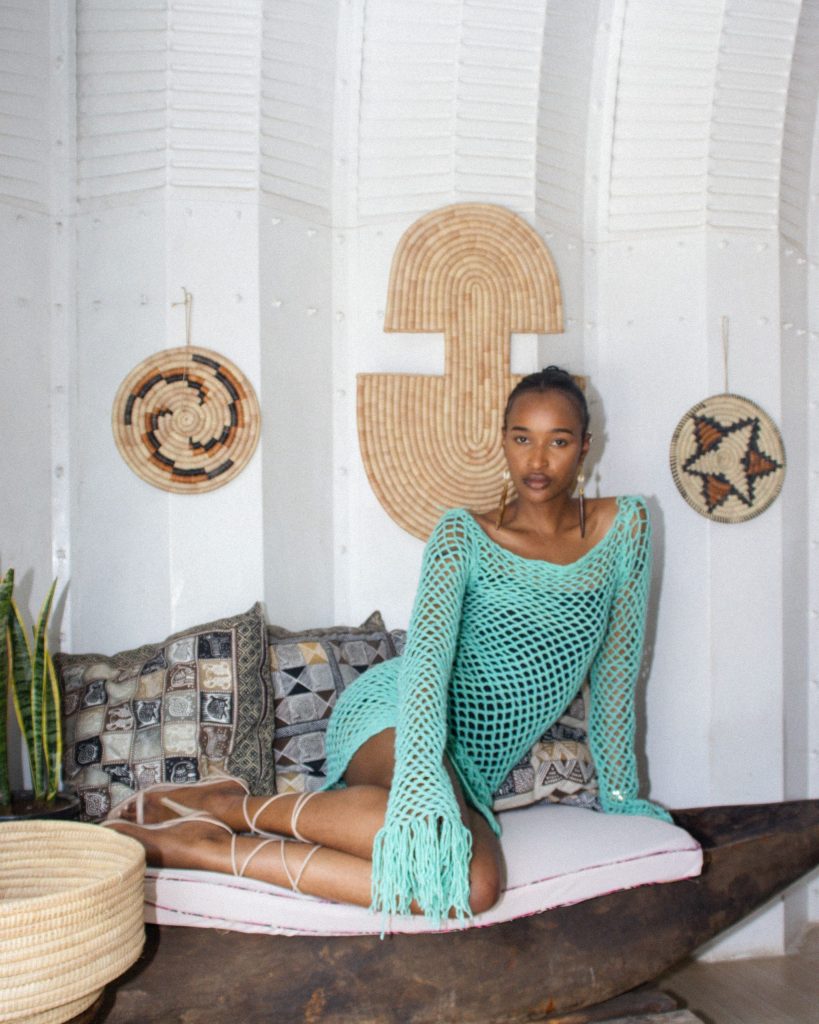
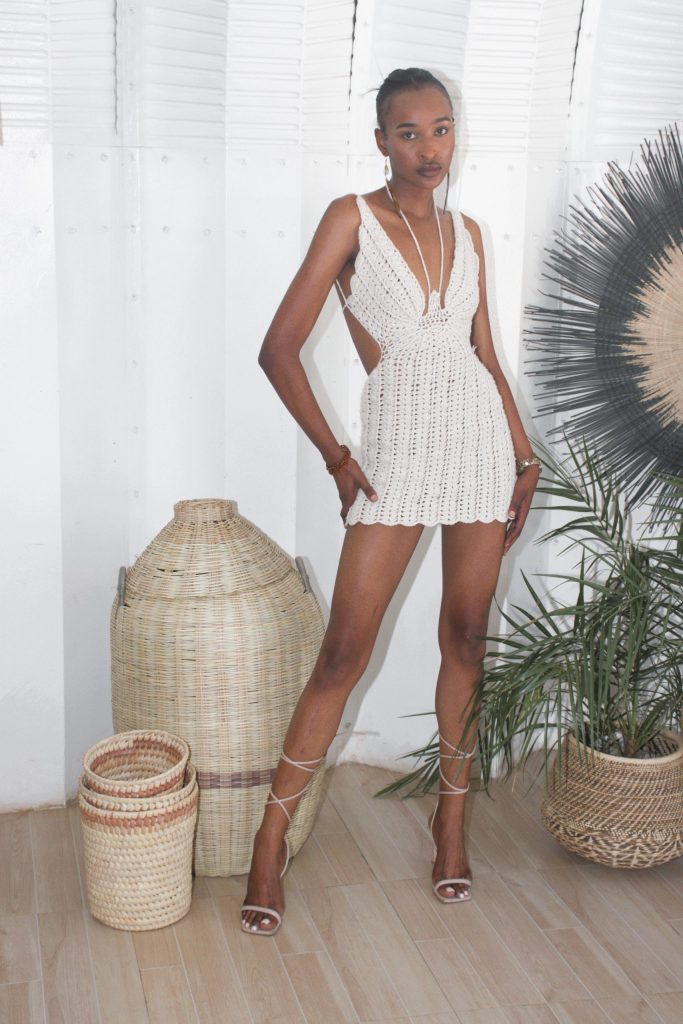
What is your creative and production process like, and how do you strike a balance between aesthetics and sustainability in your designs?
I’m quite a visual person, so I did say my creative process is to go with the vibe. I also love to dig deep into archives. I collect information from fashion magazines, books, and even people.
Kuchubé is very linked to African design, and when we think of African design, conservatively, people think it automatically equates to African prints, but that is not always the case. For instance, my mom comes from (the fisher village)- it’s an island, and they are mostly fishermen by trade. The fisherman’s net was handmade. These are some of the things that inspired me. My creative process involves making a moodboard and then funneling it down into what vibe we’re going for, and then seeing how it translates into ready-to-wear.
After that, my production process comes in, and I start to think about the materials I want to experiment with. I don’t always have to buy new things- this is where sustainability comes in, because as a designer, you want to keep the cost of production down. I mostly go thrifting at the local market in Lusaka.
The good thing with yarn is that as you crochet, you can also undo it. With eco-friendly production in mind, most of the items I make are made from at least 80% – 100% upcycled textile.
Striking a balance between aesthetics and sustainability.
Firstly, I’d say trying not to be seasonal and not to be on-trend because those things don’t last long. I prioritize making timeless pieces. In another sense, I see the sustainability of thrifting and buying new things as a way of empowering small-scale businesses around me, like myself (I am a small-scale business). When people buy from me, they are empowering me, the same way I go and buy t-shirts from other people at the market. I can see the cycle, and I can also see where my efforts are going.
How has the reception of the brand been so far?
The reception of the brand has been great. In terms of the reception in Zambia, it’s still very new, and there are quite a few crochet brands, but no one is trying to champion sustainability. I think when it comes to fabrics, textiles, and crochet from African brands, there’s not a lot, so I think we have a unique selling point, and the values that we stand for are something a lot of people can resonate with. I am just very excited to push further, predominantly we started as just a womenswear brand, but now we are going into menswear and gender-neutral wear. I also think there’s a huge level of respect people have given me. In the sense of like, evaluation of the business, the prices that I charge, people are understanding the value of Kuchubé’s pieces. Crochet is a skill set that not a lot of people know. It’s kind of a dying skill set but people are now getting to see it’s actually for anyone. I have done a crochet workshop teaching people how to crochet, and people are getting to understand that it’s for anyone. It is made by hand and with intention, and the things made by hand and with intention last way longer. I have pieces that my grandma made for me, like 20 years ago, that I still wear because, when it’s made that good, it will always last. The sales I have been able to make mostly from my social media have been from Nigeria. And that’s just through word of mouth, from people following me, and through DMs. The products have been speaking for themselves.
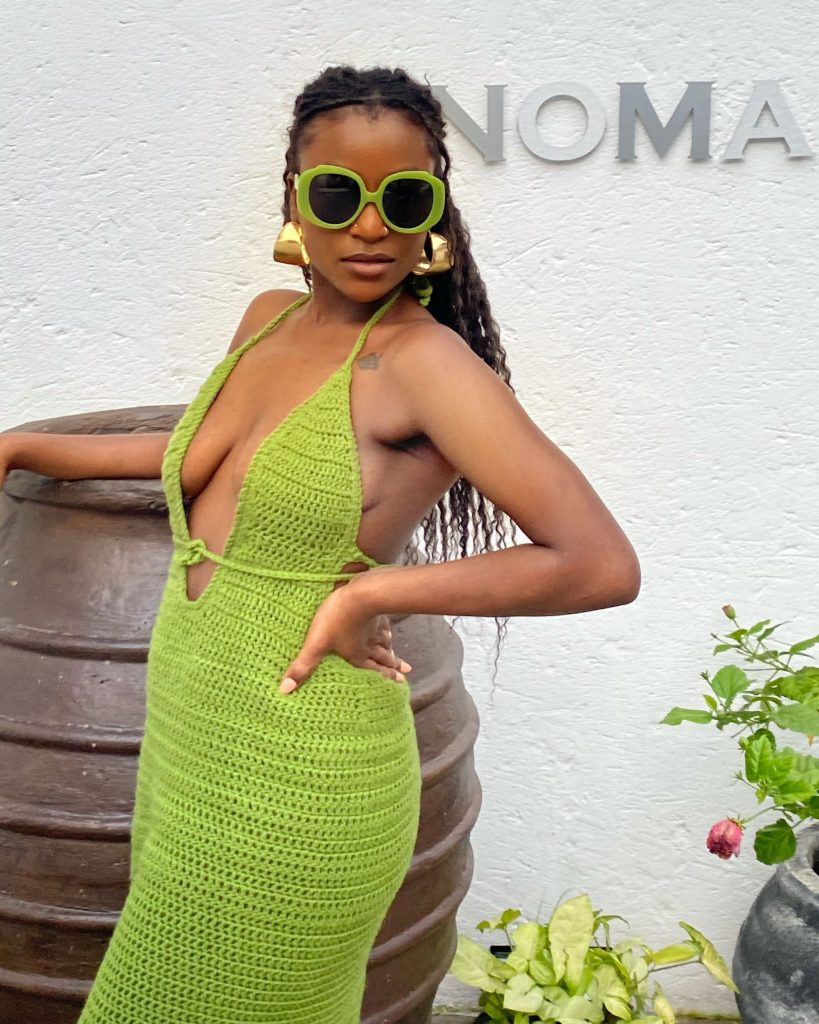

Congratulations on the AFDI micro-grant. Can you share the importance of the grant for Kuchubé?
The grant has been a pivotal moment for me and my journey with Kuchubé; it is very important to me, and I think this is one of those moments when I am filled with so much gratitude. Because before this, the brand was self-funded, I was using part of my salary to fund my idea and to pay my team. It was very much a sacrifice, I knew would pay off in the future.
Since Kuchubé is self-funded, I treated it as a passion project. I also never used to call myself a designer. But winning this grant has been the first time that I have seen myself as a designer. This is the first time that I feel like my voice is seen, heard, and valued. Also, the support as well, because I think fashion can be isolating in the sense that it feels like it’s just you against the world. I feel this is the first time I think I have a community of people who I think I can lean on for support, I have people who believe in me. I have been crocheting, but I never really shared it and never had a social media presence, which was crazy because my actual job was being a social media manager (I was helping people promote their businesses, but I wasn’t putting mine out there. As a creative, what you create is so linked to your emotions and identity. It matters because I am very sensitive about the things I post. I am also learning to separate social media metrics from my creative outputs. One of my friends in London was the one who sent me the AFDI link. I was worried my content wasn’t doing so well on social media, therefore, I didn’t see the need to apply. But I have learnt not to compare the value of my art to how it does on social media, because I think at the stage where I was when applying for this grant, I was comparing the social media metrics to the value of my art. Winning the grant is like a renaissance for me; it’s like reintroducing the brand (Kuchubé) to the world, but also to myself. I am now taking myself and the brand seriously, and ready to push things.
As a young, up-and-coming brand, what are some of the biggest challenges and limitations you face?
Some of the challenges and limitations I face that I could now say I have overcome would be a lack of investment. As a young designer, I was in a privileged position to self-fund myself for this long. But that’s not the case for everybody because I have seen people start a brand and have to end it just because of a lack of investment. Fashion is very unpredictable; there’s the glitz, glam, and luxury of it all, but a lot of it is also strategic and involves being at the right place at the right time. One of the biggest limitations was just a lack of investment, and a lack of prioritisation of fashion. I went to school in Florence, Italy, and I saw how important fashion was for the Italian ecosystem in terms of revenue, and they prioritized it. But while fashion in African countries like Nigeria and South Africa is more advanced, in Zambia, it is seen as a hobby and not taken seriously. This has hugely contributed to my limitations.

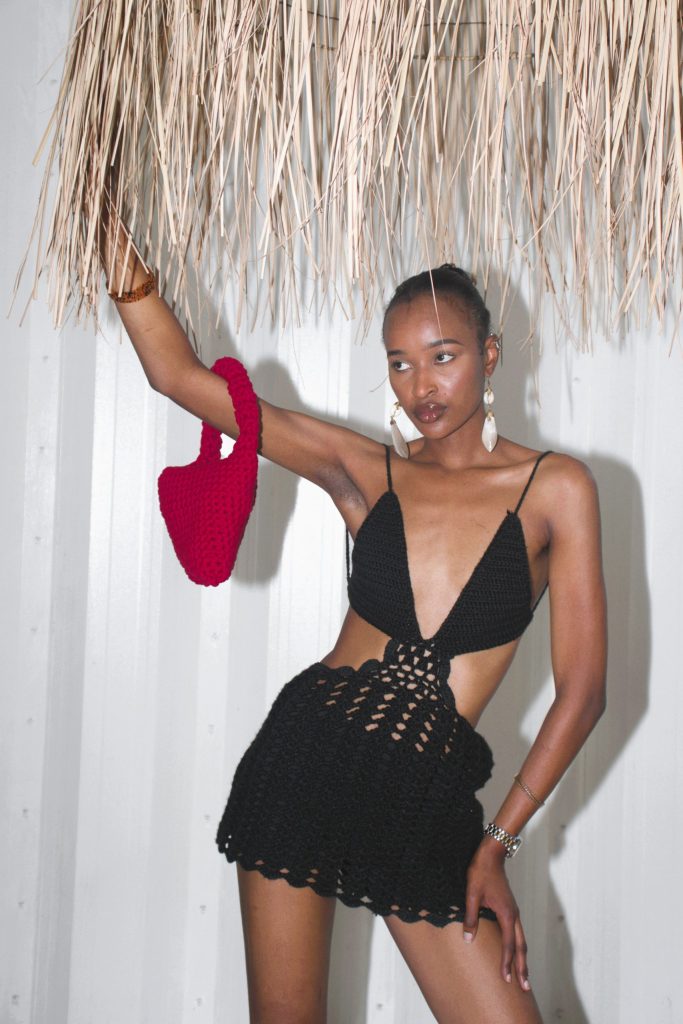
Sustainable and eco-friendly fashion has been a continuous conversation in Zambia’s fashion industry for quite a while now. Do you think the fashion industry is doing enough with these conversations? From your standpoint as an eco-friendly designer, what do you think is missing, and what can be implemented?
I think in terms of sustainable and eco-friendly fashion, the conversation is still Western-focused in the sense that when we talk about sustainable fashion brands, you will hear key international Western brands from the Global North being mentioned as key innovative movers in the sustainable fashion movement.
Which is true, but also considering how much fast fashion is impacting Africa, and how designers in the Global South are working tirelessly to champion sustainability, in terms of eco-friendly materials, in terms of textiles, why isn’t the same platform being given to designers from the Global South?. I think in that sense, they need to be more representations, and more diversity, because these brands that we see as innovators for sustainability, are still probably producing in the Global South, and are making and upcycling textiles in an indigenous way, and the materials they use are indigenous materials like the raffia.
There need to be conversations around diversity and collaborations too, the fashion industry needs to work more on bringing the platforms to these designers from the Global South. I think that would help because you can be doing the best work, but if you’re not getting the visibility, how would people know what’s going on? If people are not getting the press that they deserve for the work that they’re doing, we’re still going to think that nothing is being done, so I think more of that. Recently, I have seen the Business of Fashion have a great panel talk where they had African designers and representation. I think work is being done and the platforms are being given to more African and designers of colour. So when it comes to sustainable fashion, we need to give more visibility to designers from the Global South. I think what’s missing and what can be implemented is, firstly, we need to decentralize fashion from Europe, including the fashion institutes. We need a base within Africa and even Asia, where the fashion institute needs to be propped up. African brands from the Global South are having to push themselves and prove their worth, because the fashion ecosystem is so pushed into the Global North and European brands. We need to work more on propping up fashion schools that aren’t in Europe or a fashion institute. The fashion ecosystem here needs to be given its equity, it needs to be prioritized at the same level as the other European fashion schools are being propped up.
Written by Bolaji Akinwande.
Follow @theimullar on Instagram and X(Twitter) for more.

